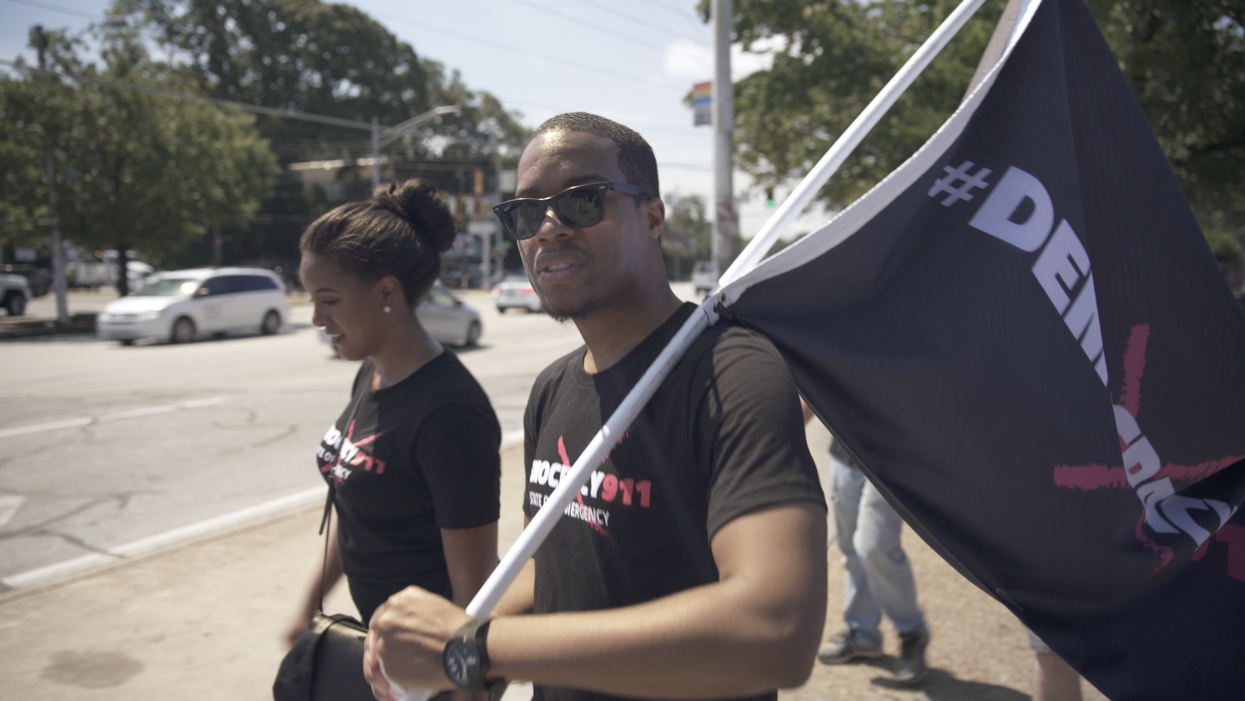Renaldo Pearson is on a long-distance walk — at least that's what he tells the friendly folks in the southeast who stop to offer him a ride.
As much as his bruised feet and sunburned skin would appreciate the relief, he politely declines each offer. The ground rules for this mission to fix America's broken democracy are simple: Keep walking and invite others to join the journey.
Two weeks ago, on the 54th anniversary of the Voting Rights Act, Pearson laced up his waterproof Adidas Terrex sneakers and set out from Atlanta. On Monday, he crossed the border into North Carolina and his 50-day journey will end, more than 600 miles later, in Washington, D.C., on Sept. 24 — National Voter Registration Day.
Upon arrival, Pearson pledges to remain on the steps of the Capitol until all the presidential candidates promise to make democracy reform a priority or the Senate passes HR 1 (or another bill that includes reforms to expand voting rights, make elections safe and competitive and end political corruption).
Pearson has financial backing for this campaign. He was inspired to take action after seeing this Washington Post headline so he connected with RepresentUs. The reform group hired him to be director of external affairs in June, and they set about planning the Democracy 911 campaign.
There is a RepresentUs team following Pearson to make sure he takes breaks and remains hydrated. And they help arrange lodging, whether at the home of a supporter or a hotel along the way.
Others are welcome to join Pearson on the road for as long as they'd like. (The route is posted in week-long chunks on the Democracy 911 website.) He hopes most people will join him toward the end for his nonviolent demonstration at the Capitol.
The Democratic-led House passed HR 1 in March, but Senate Majority Leader Mitch McConnell has been adamantly against the legislation, barring any consideration of it in his chamber. And while some presidential candidates have called for government reform, the debates lacked serious promisesfrom the Democratic hopefuls, Renaldo said.
"Folks might look at this [walk] and say, 'That is crazy' — and they're right," Pearson said with a laugh. "But fortunately, this is what falls in the realm of what legendary civil rights leader Rev. Joseph Lowery would call 'good crazy.'"
"Bad crazy," according to Pearson, are the elected officials who caused the political system to become so deficient. He said this walk to Washington is his way of calling for help.
"I just happen to be crazy enough to believe that enough Americans will answer this 9-1-1 call to fix American democracy before it is too late," he said.
As one of the lead Democracy Spring organizers three years ago, Pearson is not a newcomer to the fight for reform. In 2016, hundreds of people peacefully protested on the Capitol's steps to get big money out of politics and end voter suppression. Next month, he's hoping for a similar outcome.
Pearson's not the first to walk a long distance in the name of democracy reform, though. On New Year's Day 1999, the late Doris "Granny D" Haddock at age 88 began her 3,200-mile trek from California to D.C., calling for campaign finance reform. Haddock celebrated two birthdays during her journey, became a media darling and eventually ran for Senate in 2004.
Addressing America's existential threats of gun violence and climate change — in addition to many other important issues — "rests upon the assumption that we have a functional democracy that is devoid of enough corruption to heed the public interest and solve these issues before they literally kill us," Pearson said.
"I am not the least bit sanguine about having to do this," he said. "It does not bring me satisfying joy to be drawn to this point, but this is where we are."
As he walks with aching feet in the late summer heat, deterring unfriendly dogs with pepper spray, Pearson holds one thing in mind to push himself forward: his family who fought for justice in the civil rights movement.
"They endured so much more and had so much less. This is definitely tough, but it pales in comparison to what they faced," Pearson said. "As Coretta Scott King said, 'Struggle is a never-ending process. Freedom is never really won, you earn it and win it in every generation.' It's our time now."




















Trump & Hegseth gave Mark Kelly a huge 2028 gift